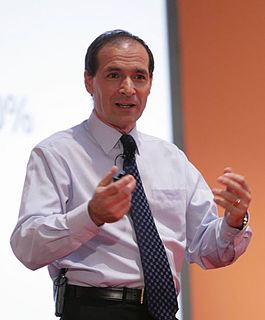A Quote by Scott D. Anthony
Not only do innovators have to deal with all of the fundamental challenges of innovation, they have to do so in an environment that often is implicitly hostile towards innovation.
Quote Topics
Related Quotes
The United States is the nation of innovation. And we have the best innovators, really, in the world. Our international property is one of our huge national economic assets. Yes, so to the extent that some are seeking to infiltrate our network, steal that information, not to have invest in the research and development that goes into innovation, that's a really big deal.
Innovation is a subset of creativity. Innovation often deals with product launches and is often relegated to the C-suite or to heads of R&D departments. Innovation requires creativity, but creativity is something that is much more broad. It applies to people at all levels of an organization. Today, we all are responsible for delivering "everyday creativity". Small creative acts that add up to big things.
Leapfrog innovation - consistent, constant, ridiculous leapfrog innovation - only happens within a dictatorship. Any time you try to do something really innovative, most people aren't going to understand it until after they experience it. So when you're developing in innovation, you have to be a dictator.
If you want the best things to happen in corporate life you have to find ways to be hospitable to the unusual person. You don't get innovation as a democratic process. You almost get it as an anti-democratic process. Certainly you get it as an antithetical process, so you have to have an environment where the body of people are really amenable to change and can deal with the conflicts that arise out of change an innovation.
To most observers, innovation is a solitary process that requires creativity and genius, perhaps even greatness. It can't, in their view, be managed or predicted, just hoped for and, perhaps, facilitated. But for me innovation was and still is more than that. It was a battle in the marketplace between innovators or attackers trying to make money by changing the order of things, and defenders protecting their cash flow.
































